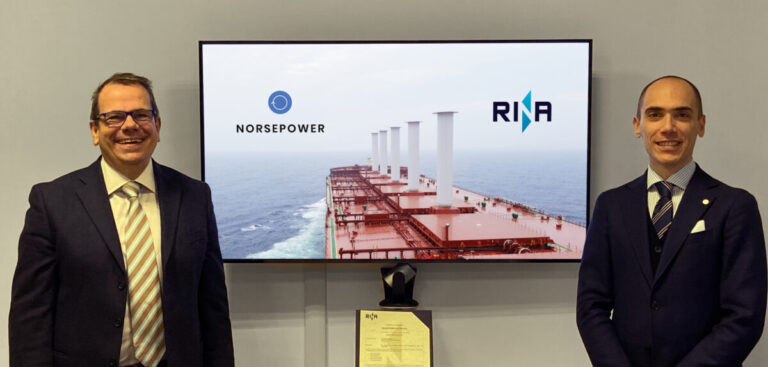Classification society RINA has granted Norsepower with an Approval in Principle (AiP) for its Rotor Sail technology.
The solution is a modernized version of the Flettner rotor, a spinning cylinder which utilizes the Magnus effect to harness wind energy. This energy is then used for ship propulsion and enables a vessel’s main engines to be throttled back, resulting in increased fuel efficiency and a reduction in greenhouse gas emissions.
Norsepower claims there is a growing interest in the Rotor Sail technology which is estimated to provide a fuel saving of between 5-25% following installation.
The International Maritime Organization has introduced GHG emission targets for 2030 and 2050, with shipping companies coming under increasing pressure to implement sustainable solutions.
“It is a pleasure to work with key partners such as RINA and for our technology to be recognized as a proven solution which delivers key savings for shipowners with fuel savings and emissions reduction, particularly as the shipping industry gets ever closer to IMO 2030 and IMO 2050 targets,” commented Tuomas Riski, CEO, Norsepower.
“Our technology has over 140,000 hours of operation and saved over 9,600 tonnes of CO2 emissions, proven by independent verification parties on vessel trials,” said Riski. “Achieving Approval in Principle from RINA takes us one step closer to improving awareness of the significant and proven savings Rotor Sails can deliver, standardizing the use of Norsepower’s Rotor Sails in shipping’s decarbonization strategy as well as demonstrating the ever-growing importance of investment in clean technologies to meet regulatory compliance.”
“The IMO has identified the role of rotor sails as a technology able to benefit the main engine power under certain conditions and we are pleased by the results declared by Norsepower’s Rotor Sails in the levels of savings which could be achieved,” said Giuseppe Zagaria, technical director, RINA.
“Wind propulsion is a freely available resource which is making large cargo and passenger vessels cleaner and more cost effective and we look forward to working with more technology providers to support shipowners in making vessels cleaner and greener.”



